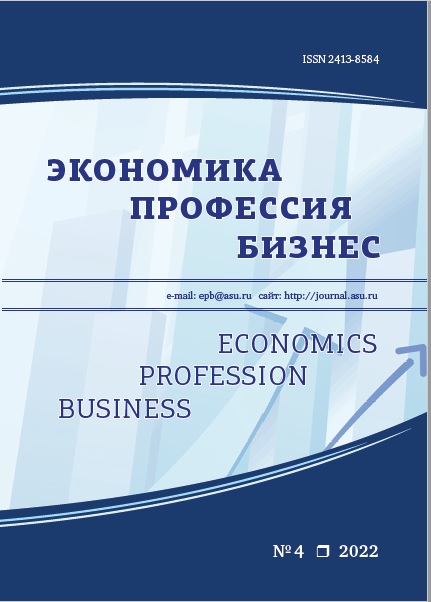АНАЛИЗ ПОКАЗАТЕЛЕЙ СИСТЕМЫ ЗДРАВООХРАНЕНИЯ В КОНТЕКСТЕ ФОРМИРОВАНИЯ ЧЕЛОВЕЧЕСКОГО КАПИТАЛА В РОССИЙСКОЙ ФЕДЕРАЦИИ
УДК 338.465:614.2
Аннотация
В статье проводится анализ показателей системы здравоохранения как одной из подсистем, формирующих и обеспечивающих эффективное использование человеческого капитала. Глобализация социально-экономических и политических процессов, ускорение информатизации, внедрение новых технологий, высокие скорости мышления требуют пересмотра и расширения теории человеческого капитала. Наиболее актуальная смена парадигмы в развитии теории человеческого капитала наблюдается в современных социально-экономических и политических условиях, связанных с необходимостью решения глобальных вопросов пандемии человечества (COVID-19), в условиях оперативного реагирования и обострения ситуации в системе здравоохранения России и мира в целом. В результате проведенного анализа показателей системы здравоохранения, применяя систему ранжирования статистических показателей, на основе представленного рейтинга регионов Российской Федерации, авторами предлагается кластерный подход к распределению регионов Российской Федерации, что позволяет обратить внимание на проблемы формирования человеческого капитала в ряде округов, выявить в целом динамику развития показателей системы здравоохранения в России. Показана необходимость развития современной системы здравоохранения как системы, обеспечивающей сохранение и повышение эффективности использования человеческого капитала.
Скачивания
Metrics
Литература
Алпеева Е. А., Окунькова Е. А. К обоснованию новой парадигмы взаимосвязи человеческого капитала и экономического роста в инновационной экономике // Национальная индустриальная экономика. 2020. №4. С.471-478.
Регионы России. Социально-экономические показатели. 2021: стат. сб. // Росстат. М., 2021. 1112 с.
Здравоохранение в России. 2021. URL: https://gks.ru/bgd/regl/b21_34/Main.htm/ (дата обращения: 28.02.2022).
Отраслевая справка МОТ: Кризис COVID-19 и сектор здравоохранения. URL: https://www.ilo.org/wcmsp5/groups/public/ed_dialogue/sector/documents/briefingnote/wcms_747870.pdf/ (дата обращения: 28.02.2022).
Прогноз социально-экономического развития Российской Федерации на период до 2024 года. URL: https://sudact.ru/law/prognoz-sotsialno-ekonomicheskogo-razvitiia-rossiiskoi-federatsii-na-period/ (дата обращения: 28.02.2022).
Стратегия пространственного развития Российской Федерации на период до 2025 года. URL: http://static.government.ru/media/files/UVAlqUtT08o60RktoOXl22JjAe7irNxc.pdf/ (дата обращения: 28.02.2022).
Стратегия экономической безопасности Российской Федерации на период до 2030 года. URL: https://docs.cntd.ru/document/420398070/ (дата обращения: 28.02.2022).
Прогноз социально-экономического развития Российской Федерации на период до 2024 года. URL: https://www.economy.gov.ru/material/file/a5f3add5deab665b344b47a8786dc902/prognoz2036.pdf/ (дата обращения: 28.02.2022).
Соколов А. П. Роль человеческого капитала в обеспечении устойчивого и сбалансированного развития территории // Научное обозрение. Серия 1: Экономика и право. 2016. № 4. С. 68-75.
Почкин Е. О., Шваков Е. Е. Развитие региональной системы здравоохранения в условиях до и после пандемии COVID-19 // Экономическое развитие региона: управление, инновации, подготовка кадров. 2021. № 8. С. 194-197.
REFERENCES
Alpeeva E. A., Okunkova E. A. To substantiate a new paradigm of the relationship between human capital and economic growth in an innovative economy // National industrial economy. 2020. № 4. Pp. 471-478.
Regions of Russia. Socio-economic indicators. 2021: Stat. Sat. // Rosstat. M., 2021. 1112 p.
Health care in Russia. 2021. URL: https://gks.ru/bgd/regl/b21_34/Main.htm/ (date of access: 28.02.2022).
ILO Sector Brief: The COVID-19 Crisis and the Health Sector. URL: https://www.ilo.org/wcmsp5/groups/public/ed_dialogue/sector/documents/briefingnote/wcms_747870.pdf/ (date of access: 28.02.2022).
Forecast of the socio-economic development of the Russian Federation for the period up to 2024. URL: https://sudact.ru/law/prognoz-sotsialno-ekonomicheskogo-razvitiia-rossiiskoi-federatsii-na-period/ (date of access: 28.02.2022).
Strategy for the spatial development of the Russian Federation for the period up to 2025. URL: http://static.government.ru/media/files/UVAlqUtT08o60RktoOXl22JjAe7irNxc.pdf/ (date of access: 28.02.2022).
Strategy for the economic security of the Russian Federation for the period up to 2030. URL: https://docs.cntd.ru/document/420398070/ (date of access: 28.02.2022).
Forecast of the socio-economic development of the Russian Federation for the period up to 2024. URL: https://www.economy.gov.ru/material/file/a5f3add5deab665b344b47a8786dc902/prognoz2036.pdf/ (date of access: 28.02.2022).
Sokolov A. P. The role of human capital in ensuring sustainable and balanced development of the territory // Scientific Review. Series 1: Economics and Law. 2016. No. 4 Pp. 68-75.
Pochkin E. O., Shvakov E. E. Development of the regional healthcare system before and after the COVID-19 pandemic // Economic development of the region: management, innovation, training. 2021. No. 8. Pp. 194-197.
Авторы, публикующиеся в данном журнале, соглашаются со следующими условиями:
a. Авторы сохраняют за собой права на авторство своей работы и предоставляют журналу право первой публикации этой работы с правом после публикации распространять работу на условиях лицензии Creative Commons Attribution License, которая позволяет другим лицам свободно распространять опубликованную работу с обязательной ссылокой на авторов оригинальной работы и оригинальную публикацию в этом журнале.
b. Авторы сохраняют право заключать отдельные договора на неэксклюзивное распространение работы в том виде, в котором она была опубликована этим журналом (например, размещать работу в электронном архиве учреждения или публиковать в составе монографии), с условием сохраниения ссылки на оригинальную публикацию в этом журнале. с. Политика журнала разрешает и поощряет размещение авторами в сети Интернет (например в институтском хранилище или на персональном сайте) рукописи работы как до ее подачи в редакцию, так и во время ее редакционной обработки, так как это способствует продуктивной научной дискуссии и положительно сказывается на оперативности и динамике цитирования статьи









